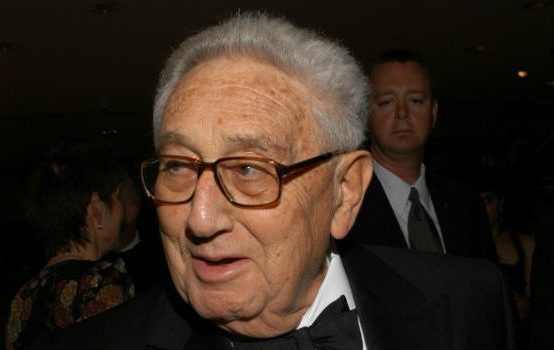No One Should Be Missing Kissinger

Thomas Meaney debunks the myth of Henry Kissinger:
Since leaving office, too, Kissinger has rarely challenged consensus, let alone offered the kind of inconvenient assessments that characterized the later career of George Kennan, who warned President Clinton against NATO expansion after the Soviet Union’s collapse. It is instructive to measure Kissinger’s instincts against those of a true realist, such as the University of Chicago political scientist John Mearsheimer. As the Cold War ended, Mearsheimer was so committed to the “balance of power” principle that he made the striking suggestion of allowing nuclear proliferation in a unified Germany and throughout Eastern Europe. Kissinger, unable to see beyond the horizon of the Cold War, could not imagine any other purpose for American power than the pursuit of global supremacy.
Although he has criticized the interventionism of neoconservatives, there is scarcely a U.S. military adventure, from Panama to Iraq, that has not met with his approval. In all his meditations on world order, he has not thought about how contingent and unforeseen America’s rise as global superpower actually was. Nothing in the country’s republican tradition prior to the Second World War demanded it.
The contrast between the worldviews and careers of Kennan and Kissinger is instructive, and it helps to explain why the Washington foreign policy consensus has gotten so many things wrong over the decades. Meaney mentions that as early as 1965 Kissinger was privately admitting that the war in Vietnam was unwinnable, but publicly he supported it and went on to preside over its continuation and escalation for many years. During the same period, Kennan spoke out against the war, and urged full withdrawal. Kennan famously said:
There is more respect to be won in the opinion of this world by a resolute and courageous liquidation of unsound positions than by the most stubborn pursuit of extravagant or unpromising objectives.
Kissinger insisted on just the opposite: that the cynical and stubborn pursuit of extravagant and unpromising objectives was necessary to prove American resolve. Kissinger couldn’t have been more wrong, as subsequent events showed beyond any doubt, but his profound wrongness had little or no effect on his standing in the U.S. It is no accident that Kissinger has repeatedly endorsed pursuing such objectives up to and including the invasion of Iraq. The blunders that Kennan warned against and correctly foresaw would be costly and wasteful are the same ones that Kissinger approved and defended.
Our government usually listens to and employs the Kissingers to make our foreign policy, and it ignores and marginalizes the Kennans once they start saying inconvenient things. Kissinger had great success in advancing himself, and he has continued to be a fixture in the foreign policy establishment almost fifty years after he last served in government, because he knows how to provide arguments that lend legitimacy to dubious and aggressive policies. He made bogus claims about “credibility” in the ’60s that helped to perpetuate one war, and later generations of hawks have used the same claims to justify involvement in new ones. Despite all the evidence that his “credibility” arguments were nonsense, Kissinger’s reputation has bizarrely continued to improve over time.
Meaney also compares Kissinger with Hans Morgenthau:
Like Kissinger, Morgenthau had become well known with a popular book about foreign policy, “Politics Among Nations” (1948). And he shared Kissinger’s belief that foreign policy could not be left to technocrats with flowcharts and statistics. But, unlike Kissinger, Morgenthau was unwilling to sacrifice his realist principles for political influence [bold mine-DL]. In the mid-sixties, working as a consultant for the Johnson Administration, he was publicly critical of the Vietnam War, which he believed jeopardized America’s status as a great power, and Johnson had him fired.
The different responses to Vietnam are telling. Kennan and Morgenthau could see very clearly that U.S. intervention was unnecessary and senseless, and they said as much. Kissinger could see the same thing, but he pretended otherwise to gain influence. U.S. foreign policy then and later would have benefited greatly from having more honest assessments of irresponsible policies and fewer cynical endorsements of unnecessary wars. If we are to learn anything from Kissinger’s example, it is that we should strive to be as unlike him as we can be.